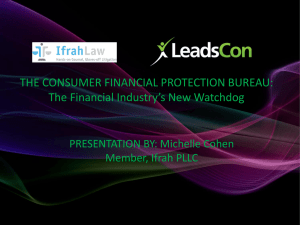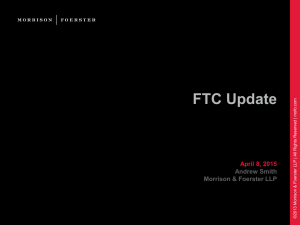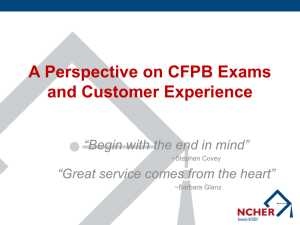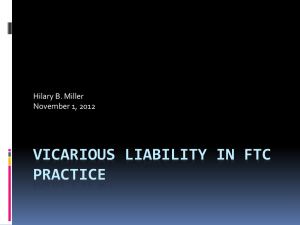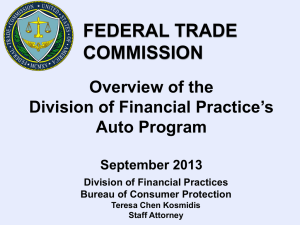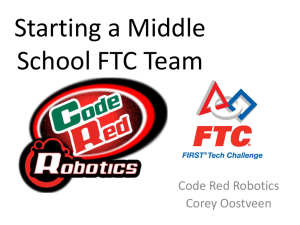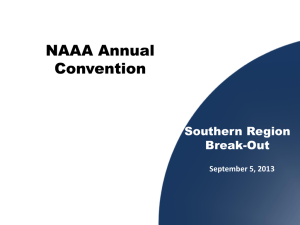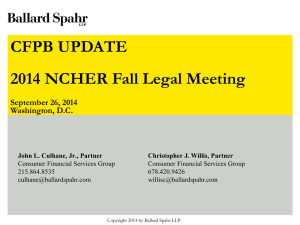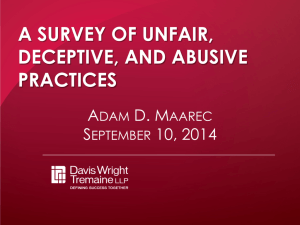The CFPB`s and FTC`s Supervision & Enforcement Authority in Auto
advertisement
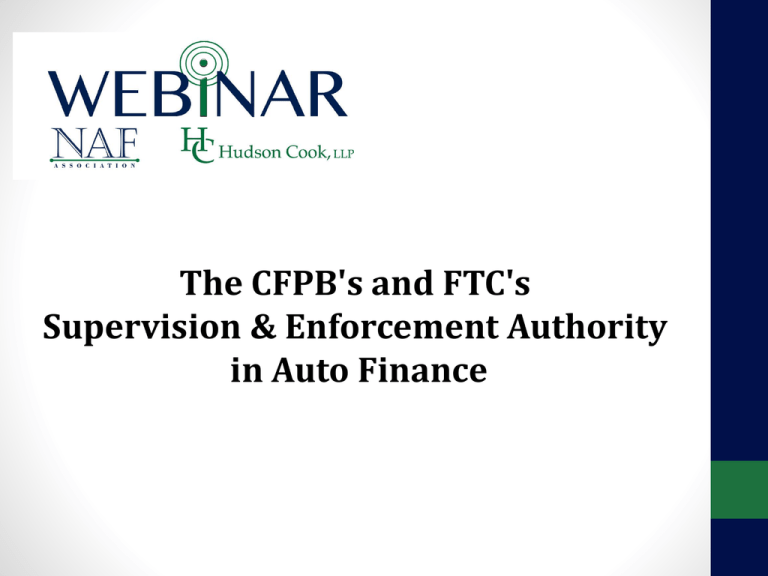
The CFPB's and FTC's Supervision & Enforcement Authority in Auto Finance Presented by With Michael Benoit Richard Hackett Lucy Morris Joel Winston The CFPB’s Proposed Larger Participant Rule for Automobile Financing The Proposed Rule Purpose The Larger Participant Test Leasing Cost of Supervision Purpose Level Playing Field 87.4 million outstanding finance and lease transactions Representing < $900 billion in value Market fragmented between banks and non-banks Exert Supervisory Authority over Non-Banks Bureau mandate Enforce federal consumer financial laws consistently without regard to a person’s status as a depository institution Aggregate Annual Originations = 10,000 Originations by nonbank entity and any affiliates during the preceding calendar year: Credit granted for the purpose of purchasing an automobile, plus Automobile leases, plus Lease and credit refinancings, plus Purchases or acquisitions of leases and purchase financing Aggregate Annual Originations = 10,000 Automobile means any self-propelled vehicle primarily used for personal, family, or household purposes for on-road transportation. The term does not include motor homes, recreational vehicles (RVs), golf carts, and motor scooters. Aggregate Annual Originations Bureau indicated it did not intend to capture: Title lending, or Securitization But: Not clear if title lending isn’t a form of refinancing, and Language of the rule does not sufficiently carve out securitization SPEs (“invest in ABS”). Leasing Two definitions: Dodd- Frank: extending or brokering leases of personal … property that are the functional equivalent of purchase finance arrangements, if (I) the lease is on a non-operating basis; and (II) the initial term of the lease is at least 90 days. CEBA §108 (Competitive Equality Banking Act) Leasing Parsing the DFA definition: Initial term of at least 90 days Non-operating Accounting definition Permissible non-banking activities for bank holding companies The functional equivalent of purchase finance arrangements Leasing Is CFPB’s determination that leases are the functional equivalent of purchase finance arrangements sound? What impact if applied to other scenarios? (TILA, ECOA, creditor’s rights) Leasing CEBA §108: Must be: A full-payout lease and A net lease. Leasing Full-payout lease: Return of full investment in property is reasonably expected, plus the estimated cost of financing the property over the term From (1) rentals; (2) estimated tax benefits; and (3) the estimated residual value of the property at the expiration of the lease term. Leasing Net lease: Lessor will not, directly or indirectly, provide or be obligated to provide for: (1) Servicing, repair, or maintenance; (2) Parts or accessories; (3) Loan of replacement or substitute property during servicing; (4) Lessee insurance costs (except force-placed); or (5) Renewal of any license or registration for the property (unless necessary to protect lessor interests). Costs of Supervision Bureau estimates based on its experience with bank examinations. On site for 9 weeks 2 weeks of preparation 11 weeks of staff time Assumes 1 full time compliance person and 1/10th of an attorney – total labor cost $27,611 (assumption may not align with reality) CFPB Enforcement in the Auto Finance Market Big Picture • Proposed larger participant rule only impacts the Bureau’s supervisory authority. • The Bureau has enforcement authority over large bank and nonbank auto finance companies. • Enforcement can occur independent of Supervision or Rulemaking. • Expect Bureau to be active in this space. How CFPB Investigations Originate • As a result of a Bureau examination. – The “PARR” letter and the decision to pursue public enforcement action. • By the Enforcement Office, based on: – – – – – Consumer Complaints Whistleblowers Media Attention Referrals from Federal/State Partners Enforcement Priorities Civil Investigative Demands • Investigations typically start with broad CIDs for documents, data, and written responses. • Compulsory process with tight deadlines. • “Meet and confer” within 10 days of receipt. • CID modification letters. • Petitions to modify or set aside the CID must be filed within 20 days of receipt. What to Expect Next • Several weeks or months without word • Then: – A closing letter (possible, but not likely yet) – Follow-on CIDs for more materials or investigational hearings – CIDs to third-parties, like banks and vendors – Bureau interviews of customers and former employees What to Expect Next • Closing letter; or • Notice and opportunity to respond and advise (NORA). – Written response will be shared internally, including with Director. • Pre-complaint settlement negotiations. • Bureau lawsuit if unable to settle. CFPB Areas of Interest in Auto Finance Market • Deceptive practices in the marketing of loans and leases. • Providing accurate information to credit bureaus. • Treating consumers fairly when collecting debts. • Discriminatory pricing and dealer markups. FTC Enforcement in the Auto Finance Market Federal Trade Commission • FTC has jurisdiction over all entities “in or affecting commerce, except: – Depository institutions – Common carriers – Non-profits – Business of insurance Includes non-bank auto finance companies and their principals FTC – CFPB • CFPB: exclusive jurisdiction over banks. • FTC: exclusive jurisdiction over non-financial services companies. • But, large areas of overlap, including non-bank auto finance companies. • Memorandum of Understanding - No duplication or inconsistent standards - Coordination and cooperation - May “divide and conquer” • Deception and unfairness standards are the same. • But, FTC and CFPB don’t necessarily see the world the same way. Recent FTC Developments • Consumer Portfolio Services (5/14). Subprime auto lender and servicer. Alleged illegal practices included: – Loan servicing • Misrepresenting fees owed • Improper assessment and collection of fees • Improper principal balance increases • Failing to disclose effects of loan extensions • Misrepresenting payment options Recent FTC Developments • Consumer Portfolio Services (cont). Subprime auto lender and servicer. Alleged illegal practices included: – Debt collection (both FDCPA and first party), including • Disclosing debts to third parties • Calls to consumers’ places of employment • Harassment • Unauthorized debits • False repossession threats • Manipulating Caller ID – FCRA Furnisher Rule violations – failing to have reasonable procedures to ensure maximum possible accuracy of data it reported and to resolve consumer disputes. Recent FTC Developments • Operation Steer Clear (1/14) – 10 cases vs. auto dealer advertising for: – TILA and CLA violations – Low-balling – “Teaser” rates – Balloon payments – “No money down” claims – Hidden fees – Limited availability Recent FTC Developments • Timonium Chrysler and Ganley Ford West (9/13) – advertised discounts available only on certain models and with certain qualifications. The “Typicality” Principle • An unqualified claim about the performance, efficacy, availability, benefits, or features of a product or service imply that consumers “typically” will achieve that result. – Consumer testimonials – “Up to” claims (“rates as low as ….”) If only a minority of the target audience will achieve the advertised results, the claim must be clearly and conspicuously qualified. “Clear and Conspicuous” Disclosures Operation Full Disclosure • FTC reviewed over 1000 magazine and TV ads to identify those with inadequate disclosures. Follow up to Dot.Com Disclosures. • Sent 60+ warning letters to advertisers that included potentially misleading statements that they tried to fix with fine print disclosures. – Prices quoted without adequate disclosure of qualifications or limitations – Accessories offered without adequate disclosure of need to purchase related items – Unrepresentative consumer testimonials without adequate disclosure of average results “Clear and Conspicuous” Disclosures Operation Full Disclosure (cont) • Clear and conspicuous disclosures should be presented: – Close to the claim to which it relates (not buried in footnotes or blocks of text) – In easy-to-read font that is as large as font used to make the claim – In a shade that stands out against background – In language that consumers will understand – Video disclosures: on screen long enough to be noticed, read and understood – Oral disclosures: in a cadence that is easy to follow FTC – Other issues • Privacy and data security • Debt collection • Fair Credit Reporting Act (furnisher obligations; risk-based pricing; permissible purpose) • Telemarketing Sales Rule • Tracking devices Questions Michael Benoit Hudson Cook, LLP 1020 19th Street, NW 7th Floor Washington, DC 20036 202-327-9705 mbenoit@hudco.com Rick Hackett Hudson Cook, LLP 22 Free Street Suite 205 Portland, Maine 04101 207-541-9556 rhackett@hudco.com Joel Winston Hudson Cook, LLP 1020 19th Street, NW 7th Floor Washington, DC 20036 202-327-9712 jwinston@hudco.com Lucy Morris Hudson Cook, LLP 1020 19th Street, NW 7th Floor Washington, DC 20036 202-327-9710 lmorris@hudco.com Jack Tracey NAF Association 7250 Parkway Drive Suite 510 Hanover, MD 21076 410-865-5431 jtracey@nafassociation.com
